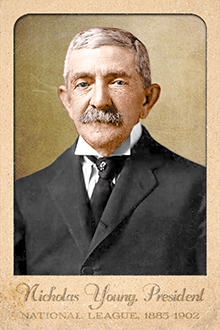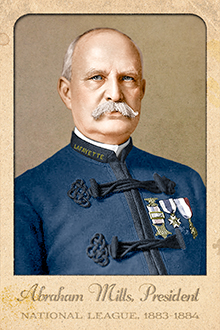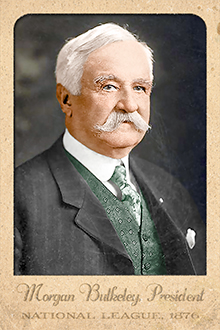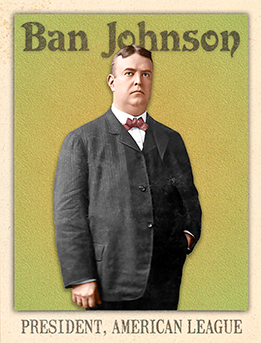
- Series: Diamond Heads '15
- League: American League
- Hall: National Baseball Hall of Fame
Byron Bancroft Johnson (1865-1931) was a big man who embodied bigger ambitions. He built the Western League into competitive shape in the 1890s and virtually forced the NL to accept his new creation as an equal. He presided over the new AL for the first two decades of the 20th century. In the aftermath of the Black Sox scandal, Judge Landis became the new czar. By 1927 Johnson was out. But what a legacy he left! His unstinting zeal for cleaning up the rowdiness of that era did not prevent him from shameless opportunism and subterfuge as he methodically put the pieces in place to rival the senior circuit. By dint of his larger-than-life persona, Johnson revolutionized the game: umpires became the true arbiters on the field, rioting players and fans no longer held ballparks hostage to violence, and the pernicious effects of gambling were largely curtailed.
- Charted the new league with his pal Comiskey but bringing on Connie Mack was a key move
- The 1903 World Series stood as the emblem of victory for the upstart AL and Ban Johnson
- Elected to Hall of Fame: 1937
- Series: Pioneer Portraits II: 1875-1899
- League: National League
Nicholas Ephraim Young (1840-1916) shepherded the National League from its inception in 1876 until the strains of dealing with the upstart AL caused his departure in 1902. Young was president from 1885-1902. Led the “Senior Circuit” during tumultuous years of job actions (the Players’ League), merger with the American Association in 1892, and the arrival of the competing American League.
- A former cricket player & government official, Young played amateur ball in Washington D.C.
- Organized the meeting that established the first pro league (Nat’l Assoc of Pro BB Players)
- His struggle to survive as NL leader against Al Spalding’s bid led to a compromise choice: Harry Pulliam
- Series: Pioneer Portraits II: 1875-1899
- League: National League
Abraham G. Mills (1844-1929), a former NL president, chaired the commission that anointed Abner Doubleday the inventor of the game in Cooperstown. Riding a patriotic fervor in that era, Mills sought to refute Henry Chadwick’s thesis that baseball grew from English “rounders.” Historians may quibble, but the Hall is in Cooperstown.
- Mills was heavily involved in the development of the “reserve” clause so reviled by players
- A leader in the Olympic movement, Mills’ last work involved planning the ’32 Winter games
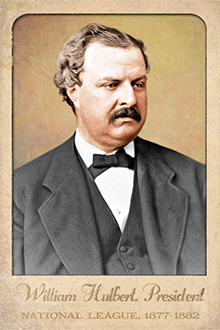
- Series: Pioneer Portraits II: 1875-1899
- League: National League
- Hall: National Baseball Hall of Fame
William Ambrose Hulbert (1832-1882) was Chicago through and through: “I’d rather be a lamppost in Chicago than a millionaire in any other city.” President of the White Stockings, Hulbert joined Al Spalding in founding the “senior circuit” NL in 1876. Repulsed by misbehavior of players and intrigue by “Eastern” owners, Hulbert worked hard to bring order and integrity to the game. Morgan Bulkeley served as first NL leader for one year before Hulbert took over the office until his death. He gave the NL authority to set schedules and hire umpires, wresting real control when he ousted the NY and Philadelphia franchises in a show of strength that solidified his leadership.
- Made the first serious moves to deal with the scourge of gambling, banning 4 Louisville players for life
- His ban of Cincinnati for beer-selling led to the formation of rival American Assoc in ‘82
- Although Spalding called him the “man who saved the game!” Hulbert was denied a plaque in Cooperstown for nearly 60 years
- Elected to Hall of Fame: 1995
- Series: Pioneer Portraits II: 1875-1899
- League: National League
- Hall: National Baseball Hall of Fame
Morgan Gardner Bulkeley (1837-1922) was an icon of Connecticut business and politics over a long and distinguished life. This Civil War vet, 4-time mayor of Hartford, 2-term Gov. of CT, U.S. Senator and CEO of Aetna for 35 years is also in Baseball’s Hall of Fame. He served 1 yr as Pres. of the new NL in 1876.
- Bulkeley earned a place in baseball lore as the figurehead for the new league’s war on out-of-control players
- NL officials cracked down on gambling, drinking and fan rowdiness at a critical juncture for the game
- Elected to Hall of Fame: 1937

